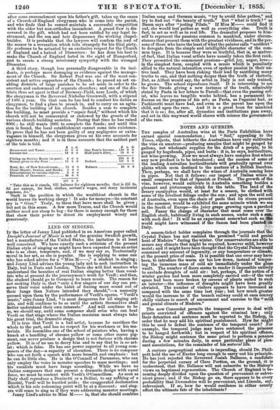NOTES AND QUERIES.
THE samples of Australian wine at the Paris Exhibition have earned special commendation ; but " Soif," appealing to the Times, objects, that hitherto the Australians have only cultivated the vine en amateur—producing samples that might be gauged by gallons, not wholesale supplies for the drink of a people, to be gauged by hogsheads, pipes, and butts : it is, he says, horticulture, not wine-growing. Now we must always have samples first where any new product is to be introduced ; and the success of some of the leading Australian horticulturists will gradually spread over plains which seem destined to the nurture of a British Bacchus. Then, perhaps, we shall have the wines of Australia coming here in pipes. Not that it follows : our import of Italian wines is small compared to that of Spanish or French. The growth of the vine, however, would cultivate in Australia something besides a pleasant and picturesque drink for the table. The land of the dreary eucalyptus would, at least for a season, be clothed with some of the loveliest foliage under the sun; and upon the arid soil of Australia, even upon the chain of pools that its rivers present in the summer, would be exhibited the same miracle which we see in the South of Europe—the juicy grape growing upon a parched soil. Fancy the change of character that must come over the English stock, habitually living in such scenes, under such a su$, with such diet ! It will be an experiment somewhat such as *Fa world might have witnessed if the Saxon had been planteaKin Italy.
A season-ticket holder complains through the journals that-the Crystal Palace has not realized the promised "mild and genial heat of Madeira" during the winter. Our conservatories are able to secure any climate that might be required, however mild, however moist; and it might have been thought that the Crystal Palace could command any amount of ingenuity, or any temperature or climate, at the present price of coals. It is possible that one error may have been, to introduce the warm air too low down, instead of temper- ing the immense mass of cold air immediately under the glass -vault. The number of doors seems to render it impossible entirely to exclude draughts of cold air : but, perhaps, if the notion of a winter garden had been more completely carried out—if the vast space had been more broken by screens of plants suited to such an interior—the influence of draughts might have been greatly obviated. The number of visitors appears to have increased as compared with the same time last year ; but how much greater would the increase be if the branch railway could at once convey chilly visitors in search of amusement and exercise to the " mild and genial climate of Madeira."
The new Concordat permits the temporal power to deal with priests convicted of offences against the criminal law ; only their detention and sentence must be reported to the Bishop, in order that he may add his spiritual punishment. How far might this be used to defeat the sentence of the temporal court? For example, the temporal judge may have sentenced the prisoner to be hanged forthwith ; but in respect of his spiritual offence, the Bishop might sentence the same priest to perform a penance during a few minutes daily, in some particular place of plea- sant associations, for the remainder of his natural life.
A curious geographical schism is impending, should Dr. Phill- pott hold the see of Exeter long enough to carry out his principle. He has just rejected the Reverend Josiah Ballance, a candidate for the perpetual curacy of Clare Portion, on the ground, -it is understood, that Mr. Ballance will not subscribe to the Bishop's views on baptismal regeneration. The Church of England is be- coming deeply divided upon the question of prmvenient or subve- nient grace; and if the Bishop go on, there appears to be every probability that Devonshire will be prmvenient, and Lincoln, say, subvenient. If so, how far would residence in either county affect the ultimate fate of the inhabitants ?


























 Previous page
Previous page